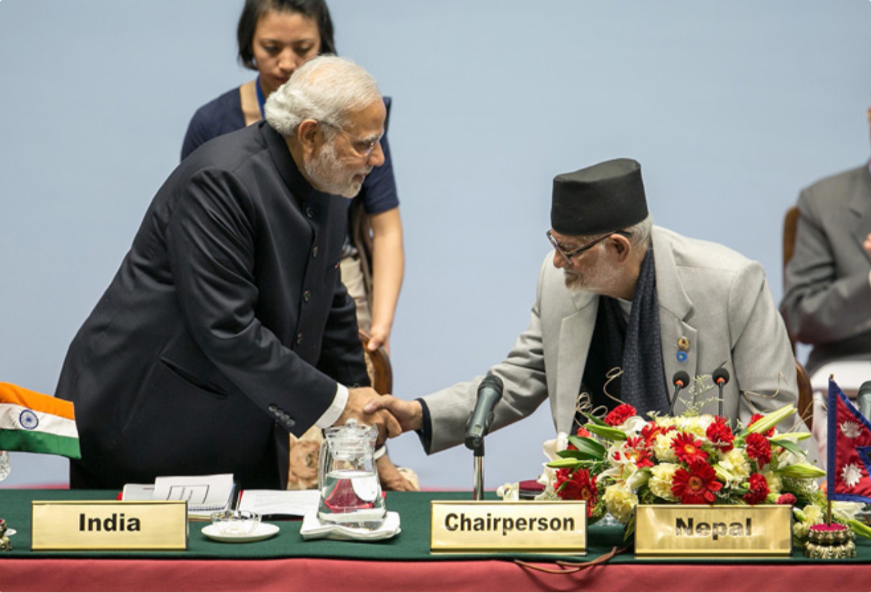-
CENTRES
Progammes & Centres
Location
Nepal and India must work towards reducing their differences. Otherwise, the growing distance could prove counterproductive to the interests of both the countries.

Since time immemorial, Nepal and India have been bound together through historical, religious, social, cultural, economic and political relations. Yet, certain developments show that Nepal is trying to distance itself from India. Efforts to thaw relations between the two countries, however, are not new. Even in 1960s, the agreement made in 1960 for creating ‘common markets’ between the two countries was scrapped to create distance. As if this was not enough, a fresh scheme was introduced through which the government in Nepal executed ‘trade diversification’ policy to conduct trade away from India to third countries. It was a different matter that the trade diversification policy subsequently did not work because it did not take cost factor into consideration. But again after a long gap, aggressive policies are being pursued in diverse sectors to distance Nepal from India’s sphere of influence.
On 5 August, for example, India abrogated Article 370 and 35A of the Indian constitution whereby Kashmir ceased its special status; it was given the same status on par with other states of India. Most of the countries of the world, except Pakistan and China, supported India’s move on the ground that it was its internal affair. In South Asia itself, countries like Sri Lanka, Maldives and Bangladesh and Bhutan immediately supported this move. But Nepal is yet to support this move.
It was not long ago that certain Nepalese leaders advocated for China’s membership in SAARC, though it was not a South Asian country. Nepal government also signed China’s Belt and Road Initiative in 2016 to construct railway lines and other roads to ensure further connectivity with China and also to reduce the country’s dependence on India.
Recently, a prominent leader of the ruling Nepal Communist Party disapproved of Indo-Pacific Strategy during his meeting with Chinese Foreign Minister Wang Yi in Kathmandu, though this strategy has India’s backing, apart from Japan, Australia and the USA. And, more than that 200 political leaders of the Nepal Communist Party (NCP) were given training by the Chinese on Chinese Communist Party General Secretary Xi Jinping's Thoughts, which sends several important messages.
Recently, a prominent leader of the ruling Nepal Communist Party disapproved of Indo-Pacific Strategy during his meeting with Chinese Foreign Minister Wang Yi in Kathmandu, though this strategy has India’s backing, apart from Japan, Australia and the USA.
A fresh bid is being made under the Citizenship Bill to discourage foreign girls from marrying Nepalese men. Though this rule applies to other foreign girls as well, it is targeted mainly against Indian girls in view of the fact that marriage relations are most common among the border inhabitants of the two countries. Such a step is taken at a time when the cases of marriage relations among the people of the two countries are already on the decline.
It is unfortunate that certain leaders, especially from among the ruling communist party, have also been advocating against citizenship of hundreds and thousands of people in Nepal who have Nepalese citizenship. An impression is wrongly being created that many of such people are Indian. As if this did not suffice, the issue of closing the age-old open border system between Nepal and India is also being raised. Sometime back, an attempt was made by certain quarters to restrict the movement of the people of the two countries at the Birgunj-Raxaul point of the Indo-Nepal border, a move which the border inhabitants had vehemently opposed.
In 2019, the government also made it mandatory for all workers, including the Indians, to have a Permanent Account Number (PAN), which is likely to affect Indian workers and also those Indian business persons in Nepal who are engaged in small businesses in Nepal. Importantly, the Camp Office of Indian Embassy in Biratnagar in eastern Nepal was also closed in 2018. It was in 2008 that this office was opened following the devastating floods that had taken a toll on thousands of people in the Terai region of Nepal and the state of Bihar in India.
The contract of 1200 MW Budhi Gandaki hydro-electric project was re-awarded to Gezhouba Group Company of China in 2018 when it was likely to be awarded to India’s NHPC. Before that the Sher Bahadur Deuba-led government in November 2017 had scrapped the agreement with Gezhouba Group on the ground that its bidding process was not competitive and also that there was no transparency in it.
In July this year, a fresh initiative was made to curb the import of Indian vegetables and fruits on the pretext of conducting pesticide tests. A provision was made for not allowing Indian registered vehicles to stay in Nepal for more than 30 days in a calendar year even on payment of charges. As vehicles in Nepal are very costly, such a provision has badly affected the movement of people from one country to the other.
In July this year, a fresh initiative was made to curb the import of Indian vegetables and fruits on the pretext of conducting pesticide tests. A provision was made for not allowing Indian registered vehicles to stay in Nepal for more than 30 days in a calendar year even on payment of charges.
Early this year in January 2019, the Indian notes above the denomination of Rs.100 were declared illegal in Nepal. Prior to the demonetisation of Rs.500 and Rs.1000 banknotes in November 2016 in India, the Nepalese were allowed to hold with them demonetised Indian notes up to Rs.25,000. As a result, the border inhabitants between Nepal and India in particular and the tourists from these countries, in general, are finding it increasingly difficult to travel in each other countries.
Over and above everything, a number of schools in Kathmandu Valley and other parts of the country, have made the teaching of Mandarin language as mandatory, for which financial and technical support is being given by the host country. On the contrary, the teaching of Hindi is opposed, though it is spoken by a substantial section of the Nepalese population both in the hills as well as in the Terai region bordering India.
Despite Prime Minister Narendra Modi’s declaration of ‘Neighbourhood First’ policy in 2014, relations between Nepal and India don’t seem to have improved. This is quite perceptible from the different measures taken by Nepal to erase India’s influence in Nepal. A major rupture in relations between the two countries occurred in 2015 at the time of the making of the constitution, when India unsuccessfully tried to pursue Nepal to amicably address the grievances of Madheshi, Janajati and other disadvantaged groups who constitute a bulk of the Nepalese population. Later on, India tried to fence its differences with the ruling communist party, but that did not prove as effective. Misunderstanding, real or imaginary, persists between the two counties to the advantage of some third party players in Nepal. Therefore, the time has come for both Nepal and India to think seriously about the ways and means of reducing their differences, if any. Otherwise, the growing distance in relations could prove counterproductive to the interests of both the countries.
The views expressed above belong to the author(s). ORF research and analyses now available on Telegram! Click here to access our curated content — blogs, longforms and interviews.

Hari Bansh Jha was a Visiting Fellow at ORF. Formerly a professor of economics at Nepal's Tribhuvan University, Hari Bansh’s areas of interest include, Nepal-China-India strategic ...
Read More +